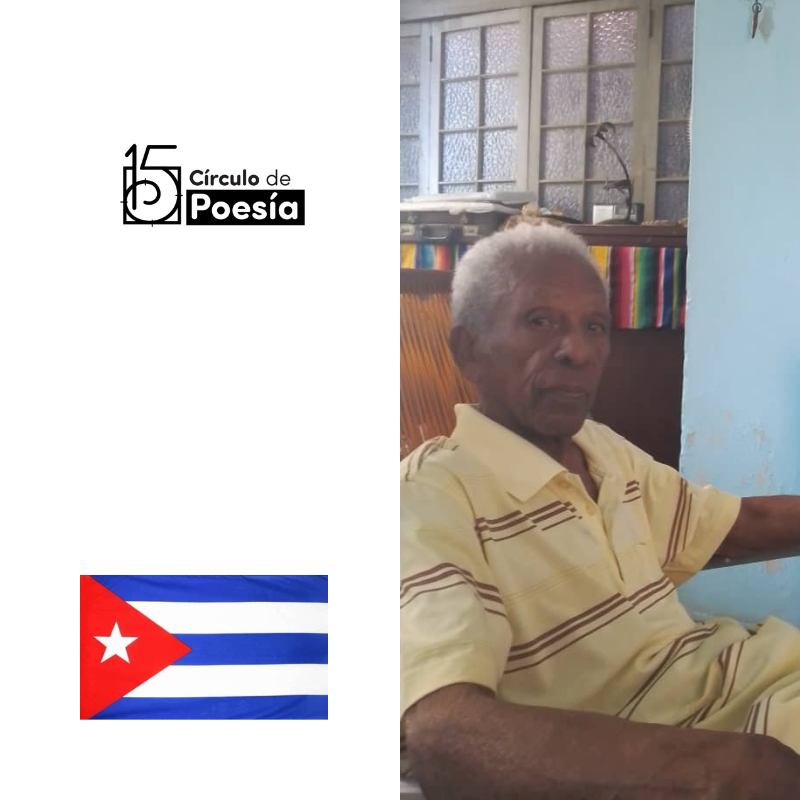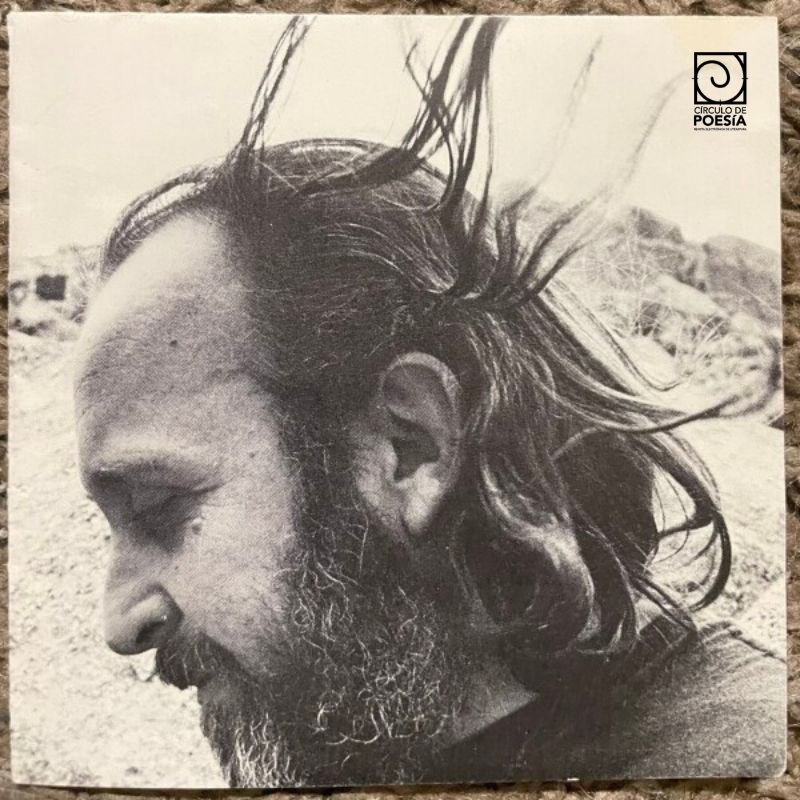Today at Círculo de Poesía: The Beast [The american way of death] Poem by Daniel Rodriguez Moya (Granada, 1976) He is one of the most prominent new voices in Spanish poetry. The mexican writer and Cervantes Prize Jose Emilio Pacheco has defined him as “an example of a transatlantic poetry as not been seen for a century, in times of modernism.” Defender of a poetry with a commitment to clarity and simplicity without ignoring the language and literary rigor, is a member of the Poetry facing uncertainty movement. Since 2004 co-chairs, along with Fernando Valverde, the International Poetry Festival of Granada (founded by both). English version by Gordon E. McNeer.
Presentamos en versión bilingüe, el poema La bestia [The american way of death] del poeta español, Daniel Rodríguez Moya (Granada, 1976), quien es una de las nuevas voces más destacadas de la poesía en español. El escritor mexicano y Premio Cervantes José Emilio Pacheco lo ha definido como “ejemplo de una poesía trasatlántica como no se veía desde hace un siglo, en los tiempos del modernismo”. Versión al Inglés: Gordon E. McNeer.
‘THE BEAST’
(The American way of death)
Somewhere over the rainbow
Way up high,
There’s a land that I’ve heard of
Once in a lullaby.
E.Y. Harburg
But the horrible train has been stopping
at so many di’erent stations,
that she doesn’t even know exactly what their names were,
or the places, or the times.
Dámaso Alonso
For Claribel Alegría.
So cutting is the wind that it speeds
the progress of rust
over long rails,
rusty cross ties. . .
And how difficult it is
to ignore exhaustion, keep watch
from Ciudad Hidalgo
up to Nuevo Laredo,
on the ‘Chiapas-Mayab’ that the sun sets on fire.
Nobody sleeps in the train,
on the train.
Clinging to the train
they all seek to reach the border,
a north star that often grows distant,
a dream outlined on a map
with colored lines:
one long and blue that shines like a river
that drowns like a well.
Left behind are the children and their questions,
the ruined hands of the women factory workers
who with an unseen gesture
say good-bye,
wait for me,
one day I might hop onto a freight car.
Behind lie Guatemala,
Honduras, Nicaragua, El Salvador,
a heart of earth beating fast.
People congregated very close to the tracks
with a drink in their hands,
the smell of fried food and tortilla
as if it were a patron saint’s day,
waiting for the moment to get on board first,
and not be le$ behind on the dusty platform,
to ride on the “beast,” in the “death train”
or to wait hidden up ahead,
in the cane fields,
with an anxious whispering.
And to dodge immigration
to be able to count themselves
among the narrow margin of the percentages,
among the four percent that, they promise,
make it to the end of the journey
more or less with the strength to cross a river.
After that, there will be silence for the rest of the day,
an asphyxiating silence,
like an arched bow that hasn’t chosen a target
and the sadness
of a funeral without a body
and the peace of a cemetery.
It’s better not to dwell on the mutilations,
on the certain death that is behind a misstep.
Or on the tattooed faces
that like jaguars lie in wait,
take advantage of the night and its ghosts
and then everything is suffering and more tragedy.
Many tell stories about the ones that didn’t make it
about the ones that didn’t return,
but there are no desertions:
There’s no price too high if at the end of the road
you achieve the promise of a better future.
Even if you have to descend into pure hell
it will be worth the suffering.
The Mexican night passes so slowly. . .
Beneath the restless moon
a wound of iron and planks
sketches a dark outline,
a trail of blood to follow.
The smell of rain on the dry earth
is debased mixed with sweat and diesel.
It’s water that doesn’t clean, that doesn’t quench your thirst,
that spills its filth
down the openings of the old machine,
a dark metaphor for a sleeping animal.
At dawn, the warning comes.
You have to jump off to one side,
the last station is drawing near.
Written on a sign: “Nuevo Laredo,
A place to explore!”
But there’s no time left
the coyote is already waiting
to cross the river,
to get across deserts,
to evade the check points, the border patrol,
the dogs, helicopters,
is that brilliance San Antonio?
the sun of injustice that pounds at your temples.
The cutting wind blows across the border
and another train leaves the Suchiate River behind,
the children, the factories,
the sand from an hourglass that turns to clay.
The cars travel through !elds
where the strangest flowers burst open.
Days and nights go by
like ropes of time in a circular movement.
Each mile won from the rails
leaves behind on the plains another southern station.
The machine moves slowly
with clusters of men on its sides.
The diesel smoke
softens a view that is lost in the distance.
“The beast” has passed by on the way to the border.
It advances toward the north
the old clickety-clack of
a freight train.
(Translated by Gordon McNeer)
‘La Bestia’
(The American way of death)
Somewhere over the rainbow
Way up high,
There’s a land that I heard of
Once in a lullaby.
E.Y. Harburg.
Pero el horrible tren ha ido parando
en tantas estaciones diferentes,
que ella no sabe con exactitud ni cómo se llamaban,
ni los sitios,
ni las épocas.
Dámaso Alonso.
Para Claribel Alegría
Tan filoso es el viento que provoca
la marcha de la herrumbre
sobre largos raíles,
travesaños del óxido…
Y qué difícil es
ignorar el cansancio, mantener la vigilia
desde Ciudad Hidalgo
hasta Nuevo Laredo,
sobre el ‘Chiapas-Mayab’ que el sol inflama.
Nadie duerme en el tren,
sobre el tren.
Agarrados al tren
todos buscan llegar a una frontera,
a un sueño dibujado como un mapa
con líneas de colores:
una larga y azul que brilla como un río
que ahoga como un pozo.
Atrás quedan los niños y su interrogación,
las manos destrozadas de las maquiladoras
que en un gesto invisible
dicen adiós,
espérenme,
es posible que un día me encarame a un vagón.
Queda atrás Guatemala,
Honduras, Nicaragua, El Salvador,
un corazón de tierra que late acelerado.
Las gentes congregadas muy cerca de la vía
con un trago en la mano,
el olor a fritanga y a tortilla
como si fueran fiestas patronales,
esperando el momento para subir primero,
y no quedarse en el andén del polvo,
montar sobre ‘La Bestia’, en el ‘Tren de la Muerte’
o esperar escondidos adelante,
en los cañaverales,
con un rumor inquieto.
Y esquivar a la migra.
Después habrá silencio durante todo el día,
un silencio asfixiante,
como un arco tensado que no escogió diana
y una tristeza
de funeral sin cuerpo
y paz de cementerio.
Es mejor no pensar en las mutilaciones,
en la muerte segura que hay detrás de un descuido
o en los rostros tatuados.
Amenazan igual que los jaguares,
aprovechan la noche y sus fantasmas
y ya todo es dolor y más tragedia.
Es tan lenta la noche mexicana…
Bajo la luna inquieta
una herida de hierro y de listones
traza un perfil oscuro,
un reguero de sangre que seguir.
El olor de la lluvia sobre la tierra seca
se corrompe mezclado con sudor y gasóleo.
Es agua que no limpia, que no calma la sed,
que sucia se derrama
entre las grietas de la vieja máquina,
una oscura metáfora del animal dormido.
Escrito en un cartel: “Nuevo Laredo.
¡Lugar por explorar!”
El coyote ya espera
para cruzar el río,
atravesar desiertos,
y burlar el control, la border patrol,
los perros, helicópteros,
¿aquello tan brillante es San Antonio?,
el sol de la injusticia que percute las sienes.
Sopla el viento filoso en la frontera
y otro tren deja atrás el río Suchiate,
los niños, las maquilas,
la arena de un reloj que se hace barro.
Transitan los vagones por los campos
donde explotan las más extrañas flores.
Pasan noches y días
como sogas del tiempo en marcha circular.
Cada milla ganada a los raíles
aleja en la llanura otra estación del sur.
Marcha lenta la máquina
con racimos de hombres a sus lados.
El humo del gasóleo
difumina un perfil que se pierde a lo lejos.
Ha pasado ‘La Bestia’ camino a la frontera.
Avanza hacia el norte
el viejo traqueteo de un tren de mercancías.





